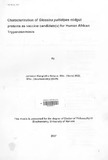| dc.contributor.author | Kinyua, Johnson K | |
| dc.date.accessioned | 2013-05-20T11:19:47Z | |
| dc.date.available | 2013-05-20T11:19:47Z | |
| dc.date.issued | 2007 | |
| dc.identifier.citation | Ph. D (Biochemistry) Thesis | en |
| dc.identifier.uri | http://erepository.uonbi.ac.ke:8080/xmlui/handle/123456789/23909 | |
| dc.description | Master of Science Thesis | en |
| dc.description.abstract | There are currently no vaccines available against trypanosomosis and
vector management as an option has problems with sustainability. Anti-vector
and transmission blocking vaccine development is thus a novel strategy against
vector borne diseases. Vaccines that target blood-feeding disease vectors, such
as tsetse flies, mosquitoes and ticks, have the potential to protect against the
many diseases caused by vector-borne pathogens. Vaccines developed against
midgut proteins have been shown to reduce the fecundity of flies feeding on
immunized animals. Midgut proteins isolated from the midgut of Glossina
pallidipes were used to immunize rabbits and their efficacy as vaccine
candidate(s) against the tsetse fly, and their potential to block transmission of
Trypanosoma brucei rhodesiense assessed. | en |
| dc.description.sponsorship | University of Nairobi | en |
| dc.language.iso | en | en |
| dc.title | Characterization of Glossina pallidipes midgut proteins as vaccine candidate(s) for Human African Trypanosomosis | en |
| dc.type | Thesis | en |
| local.publisher | Department of Chemistry, University of Nairobi | en |

